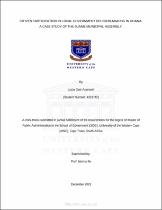| dc.description.abstract | Scholarly consensus underscores the essential role of citizen engagement in local governance as a foundational element of representative democracy and effective governance. Across various African nations, the pursuit of increased democracy and good governance aligns with efforts to shift away from highly centralized systems toward models prioritizing individual initiatives and citizen involvement in governmental affairs. Inclusive participation is critical for municipal budgets, development plans, bylaws, and other aspects impacting citizens' daily lives. However, despite the growing demands for participation, accountability, and transparency, there remains a significant gap in well-defined and documented research on citizen participation in local government activities in Ghana. This qualitative case study is guided by Arnstein's Ladder of Participation and Fung's Varieties of Participation model. It focuses on the Suame Municipal Assembly (SMA) to examine the extent of citizen participation in local government decision-making in Ghana. The study's findings shed light on the significance of town halls and public hearings as crucial platforms for citizen engagement in local government decision-making at the SMA. Additionally, there are highlighted imbalances in influence during decision-making due to a knowledge gap between citizens and others, such as municipal staff and assembly members. Furthermore, the findings revealed that although there is some level of two-way communication during town hall and public hearings, officials often dominate the discussions, diminishing the importance of citizens' viewpoints within the Assembly. The study also identifies several barriers that hinder meaningful participation, including limited accessibility, inadequate information dissemination, inconsistent meeting scheduling, a perceived lack of influence, constraints imposed by legislative and policy frameworks, and financial limitations. To address these challenges, the study recommends that the Assembly expand avenues for citizen engagement and create an inclusive environment where citizens feel empowered. | en_US |

